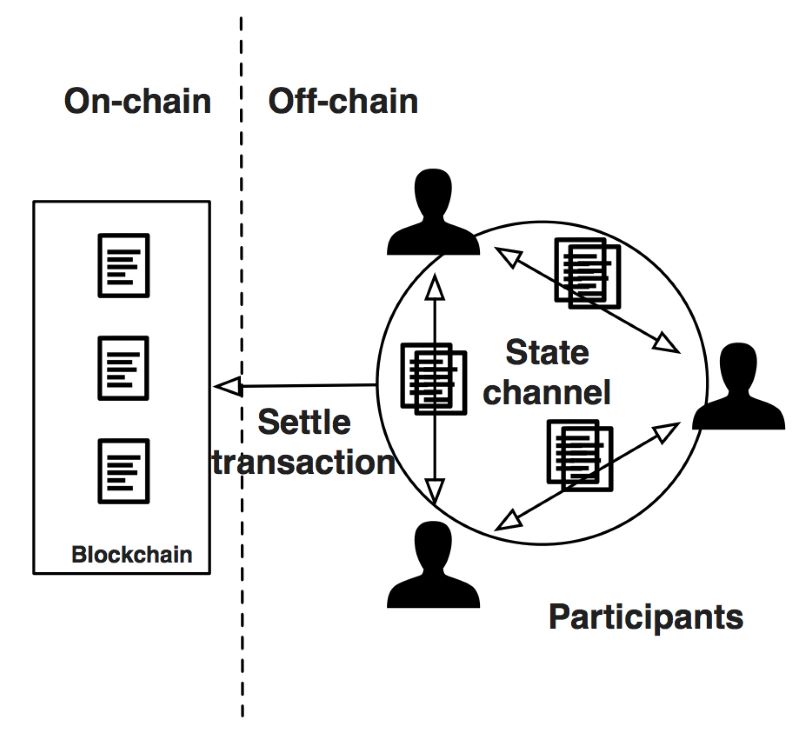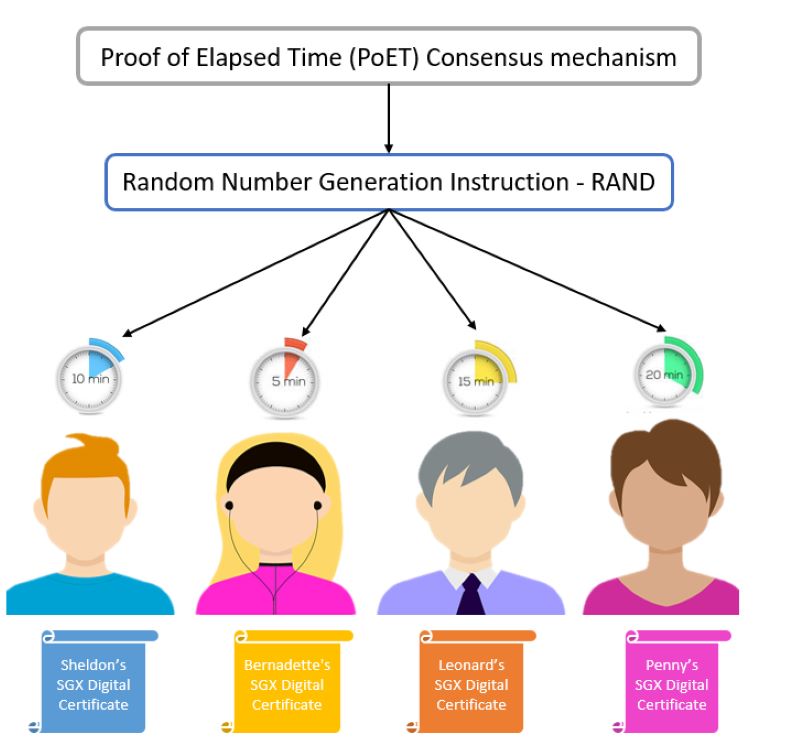Proof of Elapsed Time in Crypto: Revolutionizing Consensus?
“Are you tired of the same old ways to secure crypto networks? Good news: Proof of Elapsed Time in crypto is here, changing the game. It’s not just new; it’s a whole different playfield. Imagine a tech that’s both fair and saves energy. That’s PoET –quite the brainy breakthrough. While others use raw computing power, PoET uses time, making it special. It’s turned heads by offering both speed and trust without the energy drain. So, let’s dive right in, dissect how this mechanism rocks the crypto world, and see if it has the muscle to push blockchain to new heights.”
Understanding the Proof of Elapsed Time (PoET) Consensus Mechanism
What is PoET in the Crypto Sphere?
What is PoET? It’s a new way to keep crypto fair and safe. Imagine you and friends pick who goes first in a game by drawing straws. But instead of straws, computers use a clock. Each one waits a random time. The one with the shortest wait wins the game and gets to add new info to the blockchain. This is what PoET does in crypto.
This way, each computer, or ‘node’, gets a fair chance. No one can cheat as no one knows whose clock will ring first. This makes things fair and keeps the digital money’s record in order. Plus, it does not need much power like some other ways. This is why people who care about the planet like PoET.
The Unique Aspects of PoET vs Traditional Consensus Algorithms
How is PoET different from old ways? Old ways like Proof of Work (PoW) or Proof of Stake (PoS) use a lot of power or need users to hold lots of crypto. PoET is cool because it doesn’t need either. It uses clever math and safe spots on a computer to make sure no one cheats time. This safe spot is called a ‘trusted execution environment’.
With PoET, computers don’t need to solve tough puzzles like in PoW. And you don’t need to have lots of coins like in PoS. This means any person with a simple computer can join in. This makes it easier for more folks to get involved in crypto.
And there’s more. PoET is not wasteful. It’s like a smart car compared to a big truck. It gets the job done without using lots of fuel or making a mess. This is key because we all need to look after our planet.
Also, PoET plays well with others. It can work with different blockchain network protocols. This means it can help connect all sorts of computers to work together. This could be the future of how we all agree on what’s true in the digital world. From money, to messages, to making sure we’re all following the rules.
Using PoET, we can also pick leaders in a good way. ‘Leader election mechanism’ is a fancy term for picking who gets to add the next block of info. It’s like picking a team captain. In PoET, this choice is clean and quick.
Lastly, PoET is continuing to spread its wings. More folks are seeing that it’s a solid way to do things and starting to use it. This will spark more ‘blockchain innovation’. That means smarter and cleaner ways to use crypto are on the horizon. This could change how we all do things in the future.
So, understanding PoET in blockchain is like learning to share toys in kindergarten. It teaches us to play fair and take turns, in the grown-up world of crypto.
The Role of Intel Sawtooth in Advancing PoET
How Intel Sawtooth Enables Efficient PoET Implementation
Proof of elapsed time blockchain methods ask a simple question. Who waits the longest? The answer is the one who gets to add the next block. To get into this, let’s chat about Intel Sawtooth for blockchain. Imagine a system where your computer waits a random time. After this wait, it can win a chance to add to the blockchain. This is PoET. Simple, fair, and it spreads the chance to many.
Now, PoET could get tricky to manage. But, thanks to Intel Sawtooth, we keep things running smooth. It lets us check who’s turn it is without a sweat. It’s like having a smart organizer for every blockchain party. And who doesn’t like a well-planned party?
Intel Sawtooth is cool because it uses what’s at its core. It makes sure that the game is fair for everyone. And no one has to waste energy just to take part. It’s like a race where you don’t run. You just wait for your turn and go when the light turns green.
Remember, big words aren’t needed to explain big ideas. PoET beats the old proof types in cryptocurrency. It doesn’t gobble energy like proof of work (PoW). It also doesn’t just favor the rich like proof of stake (PoS). With PoET, each player has to wait for their turn. It’s like a game of musical chairs without the rush when the music stops.
Trusted Execution Environments: The Foundation of PoET Security
You might ask, “How does PoET keep things safe?”. The answer is trusted execution environments. Think of it as a special room where you can count your money without worry. No one else can peek inside. It’s just you and your coins, safe and sound.
These rooms stop cheaters. They make sure every computer plays by the rules of the game. No dirty tricks allowed. This keeps your money safe and the game fair.
And let’s not forget, when it comes to crypto, trust is king.
By using this “special room,” PoET knows who really waited their turn. It’s like having a magic watch that can’t lie. It stops sneaky moves to cut line. This “special room” is the heart of PoET’s trust.
These rooms are all over the place in Intel Sawtooth. They keep an eye on the validator node selection PoET sets. So, while one computer wins its time to add a block, others can trust it’s true. This works much like a neighborhood watch. Everyone looks out for each other’s houses.
In summary, the power of PoET comes from its wait-and-see game. It uses a little patience instead of a ton of energy. Intel Sawtooth is the smart friend helping PoET run without hitches. Trusted execution environments are the secret sauce, keeping everyone honest. This tech combo brings more fairness to crypto. It also lays the work for open source blockchain platforms. Together, they’re changing how we do money on the web. And that, my friends, is a smart move.
Scaling the Blockchain with PoET: Challenges and Opportunities
PoET’s Answer to Blockchain Scalability Issues
Have you ever waited ages for a crypto transaction? Frustrating, right? Blockchains can get slow. As more folks use them, they must grow but stay nimble. Proof of Elapsed Time is like a game changer here. What is PoET? It’s a smart way to keep a crypto network in sync without guzzling power.
When networks grow, they often hit a wall. More transactions can mean more lag. Understanding PoET in blockchain means seeing how it can leap this wall. It’s all about picking who adds the next block of transactions. It does so in a way that’s fair and doesn’t hog energy.
PoET consensus mechanism makes each computer or node take a number. Think of it as a deli line. You pick a ticket and wait your turn. When your number comes up, it’s your shot. This keeps things moving without a wild rush. With PoET vs PoW (proof of work), we ditch the energy-heavy mining race. And with PoET vs PoS (proof of stake), we avoid hoarding coins to play.
That’s right, scaling blockchain with PoET is a wait-your-turn system. Every node gets a random wait time. The node with the shortest time adds the next block. This queue system makes the whole thing smoother and swifter.
Maintaining Consensus Security While Scaling with PoET
Now, making bigger faster is one thing. Keeping it tight is another. Blockchain network protocols deal with lots of coin. They need iron-clad consensus security in crypto. How does PoET manage moving up without losing grip? Trusted execution environments are key. Only in these safe spaces can cryptographic timers in PoET run unbent.
Imagine secure blockchain transactions as VIPs needing top-notch safety. That’s why the leader election mechanism matters tons. PoET picks the new block’s leader without giving anyone an edge. That way, no one can mess with the wait times. Validator node selection in PoET is clean and fair.
Each player in the time-based consensus algorithm gets a timer. When the timer ticks down, voila! They can pop in a block if they have one ready. That way, nobody waits too long or jumps the line. It cuts down on jitters or halts in the system – a smooth flow is what we get.
PoET focuses on fairness in blockchain protocols, so every user gets a fair shot. As for energy, it goes easy on power, unlike some of its kin. Efficient consensus algorithms are the meat and potatoes of PoET. This means better eco-creds for crypto. It’s energy-efficient crypto algorithms for the win.
The thing is, implementation of PoET algorithm has to be spot-on. One slip and we could see double-spending horrors or slowdowns in transaction processing speed with PoET. Reducing energy consumption in blockchain is a big plus, but there’s no cutting corners with security.
PoET adoption is picking up because it nails a tricky thing: staying quick and eco-friendly while growing. That’s one tall order, but PoET is reaching those heights. As we look ahead, its potential keeps getting clear. Sustainability in blockchain technology? It’s on the rise. Blockchain innovation keeps moving forward with PoET leading some of that charge.
The Future of PoET in Cryptocurrency: Adoption and Impact
Barriers and Drivers of PoET Adoption in Blockchain Networks
Many folks ask, “what is PoET and why is it not everywhere?” Well, PoET, or proof of elapsed time, is a way for blockchain networks to reach agreement, or consensus, on what data or transactions are correct, without needing much energy. Adoption isn’t widespread yet because it’s new to many and still being tested out. Intel Sawtooth is a platform that shows how PoET can be used in real life. It makes things secure and fair for everyone using it.
When it comes to bringing PoET into the big picture of blockchain, there are speed bumps and gas pedals. Some roadblocks are that folks might not know about it or trust it yet. Plus, we need special hardware to make it work right, which not all computers have. What speeds things up is PoET’s promise to cut down on energy bills and to keep everything running smooth and fair.
PoET needs random selection to keep the game fair. In other words, it picks who gets to add new data to the blockchain in a way that can’t be guessed or rigged. This is different from proof of work (PoW), which uses a lot of energy, and proof of stake (PoS), which favors those with more money. PoET levels the playing field and doesn’t use much juice.
A big question is, “how does PoET pick who gets to add to the blockchain?” It uses cryptographic timers – kind of like a secret stopwatch – to make the choice randomly. Each validator, or computer that keeps the blockchain honest, waits its turn. The first to finish waiting, gets to add the new data.
The Impact of PoET on Energy Consumption and Sustainability in Crypto
Saving energy and keeping our planet green is getting more and more important. That’s where PoET shines in crypto. It uses way less power compared to older methods like PoW used in Bitcoin mining. Cryptocurrency usually gets a bad rap for using as much energy as whole countries. PoET turns that around, making crypto more eco-friendly.
Understanding PoET in blockchain means seeing how it changes the game for energy use. With PoET, blockchains don’t need fancy, power-hungry computers to keep them safe and up to speed. This means smaller energy bills, less heat, and a happier Earth. The cool part is, PoET still keeps track of transactions just as well, making sure no one spends the same money twice, which is key for trust.
By using time to make big decisions in a blockchain, energy-efficient PoET could lead crypto into a new era – one where tech, trust, and planet care go hand in hand. It doesn’t just cut costs; it also opens the door to more people and businesses to jump on the blockchain without worrying about a big carbon footprint.
Scaling blockchain with PoET could really change how fast and far blockchain can go because it handles more transactions without getting bogged down or hitting the power grid hard. This is big news for everyone who thinks crypto is the future but wants to keep our skies blue and our forests green.
What we’re seeing is just the start. As more folks understand and trust PoET, it could become a key player in making blockchain a part of everyday life. It’s not just about saving energy – it’s about opening doors to new and exciting ways we can all use crypto safely, fairly, and with care for the world we all share.
We’ve just explored the Proof of Elapsed Time, or PoET, and how it’s changing the game in crypto. We learned what PoET is and why it’s different from older methods. Intel Sawtooth is pushing PoET forward, making it work better and keeping it safe with special Trusted Execution Environments.
We also looked at how PoET can grow the blockchain without making it less secure. Finally, we thought about the future. What stands in the way of PoET becoming more popular? And how can it help make crypto greener?
So, here’s my final take: PoET has lots of promise. It could lead to faster, safer, and less energy-hungry crypto. Overcoming the hurdles ahead, PoET might just be the key to a sustainable crypto future. Keep an eye on it!
Q&A :
What is Proof of Elapsed Time in cryptocurrency?
Proof of Elapsed Time (PoET) is an algorithm used in blockchain networks that ensures a fair and efficient blockchain consensus mechanism. It relies on a lottery system where each node in the network waits for a randomly assigned period of time, and the first one to complete the designated waiting time gets the right to create the next block. This method aims to reduce the high energy consumption often associated with Proof of Work (PoW) systems, by limiting the need for competitive problem-solving.
How does Proof of Elapsed Time ensure network security?
Proof of Elapsed Time ensures network security through its unique lottery process and the use of trusted execution environments (TEEs). TEEs provide a secured area of a main processor, preventing potential tampering with the waiting times assigned to each node. By ensuring that each participant in the network has an equal opportunity to create a block, it prevents centralized pooling and increases security against potential attacks.
Is Proof of Elapsed Time more efficient than Proof of Work?
Proof of Elapsed Time is considered to be more efficient than Proof of Work, primarily because it requires substantially less energy consumption. PoET eliminates the need for the extensive computational work seen in PoW systems, leading to lower energy costs. This efficiency makes PoET an attractive option for blockchain networks looking to minimize environmental impact and operational costs.
Can Proof of Elapsed Time be used in any blockchain?
Proof of Elapsed Time has been designed to be adaptable and it can potentially be implemented in various blockchain frameworks. However, its adoption may require certain hardware capabilities, such as a trusted execution environment, to ensure the security of the consensus process. Because of this, not all blockchains may be able to utilize PoET, particularly those that cannot support the required hardware specifications for TEEs.
What is the main advantage of using Proof of Elapsed Time in crypto?
The main advantage of using Proof of Elapsed Time in crypto is its ability to provide a scalable and energy-efficient consensus mechanism. By replacing the competitive nature of block creation with a random lottery based on time, PoET minimizes the need for energy-intensive calculations and allows for a more equitable participation among nodes. This makes the blockchain both environmentally friendly and accessible to participants with less computational power.





